Meet our newest member: The Slovak Space Office
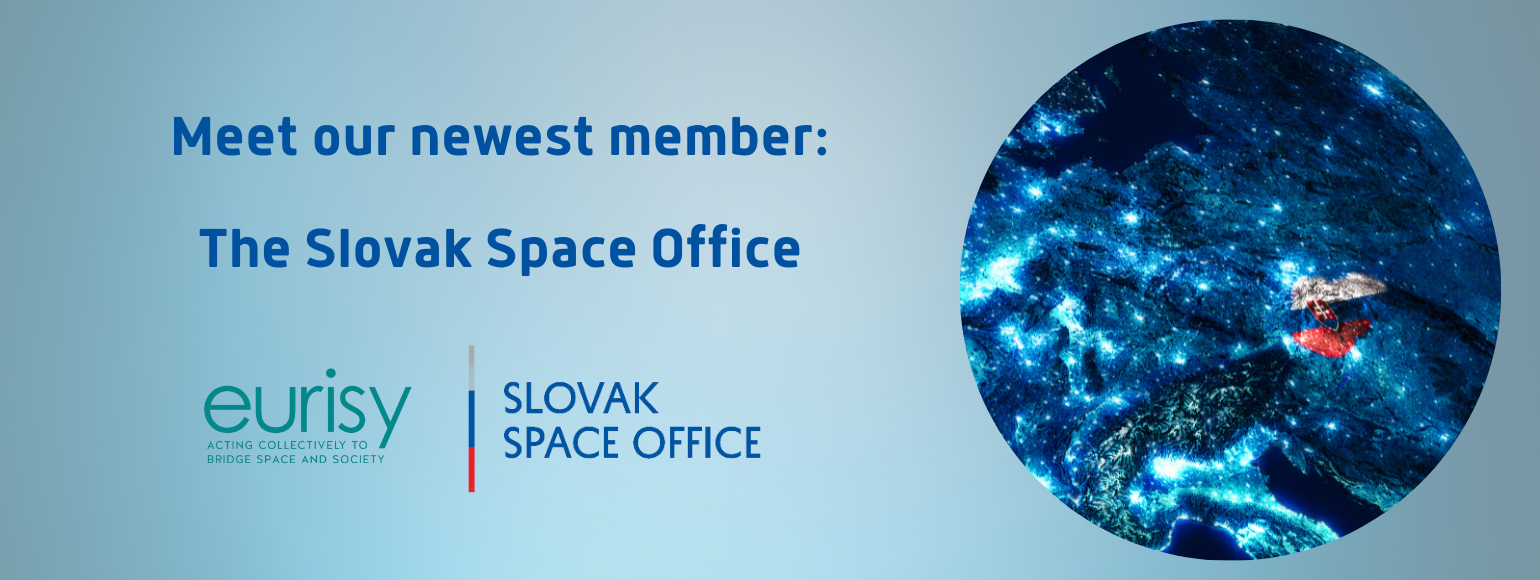
The Slovak Space Office was officially welcomed as a Eurisy member in June 2021. By joining our community of space agencies committed to promoting the benefits of space for society, the Slovak Space Office aims to generate new opportunities for businesses and researchers in Slovakia. To get to know better our newest member, we interviewed Mr Michal Brichta, Head of the Slovak Space Office Industry Branch.
Slovakia holds a dynamically expanding segment of the space industry. Could you give us a bit of background about the Slovak space sector?
The Slovak space sector is not completely new. It actually dates back to the seventies when our researchers and engineers were participating in international missions to develop space hardware. Since then, there has been a continued involvement of Slovak research and development in major international space missions such as Rosetta, Bepicolombo, and JUpiter ICy moons Explorer (JUICE). Today, the sector is still benefitting from these decades of experience and it is growing fast at all levels of the space value chain.
In this context, we should also mention the two crewed missions involving our citizens Vladimir Remek, who flew to space in the late Seventies, and Ivan Bella who spent nine days on board the MIR space station in 1999. Not a bad track record for a small country as Slovakia.
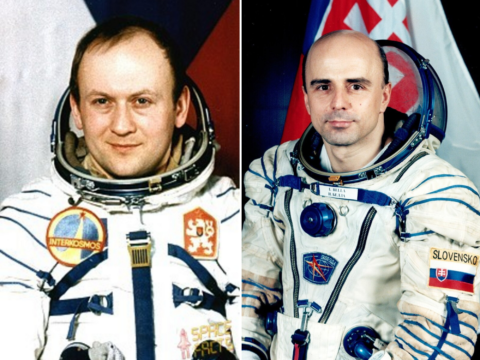
What is the current status of the Slovak space sector?
The Slovak Space Office performed a study to map the country’s space ecosystem. Currently, Slovakia counts more than 40 established companies actively involved in the space sector. More than half of them focus on the upstream segment, but most of the space-related revenue is concentrated in software applications using Earth observation or navigation and positioning technologies.
In the last decade it emerged at global level a growing tendency of spinning in non-space companies where overlaps of technology and capabilities can be identified. The Slovak Space Office is particularly keen to explore this opportunity. It makes sense not only to support completely new projects and start-ups but also to help established companies to broaden their scope in order to maximise the potential of what already exists. Typically, this can be the case for companies specialised in relevant areas such as electronics, machinery, or IT, among others. Such a diversified approach can, among other things, help an emerging space country to make its industry base much more stable and sustainable.
Could you tell us more about this support programme for start-ups and SMEs new to space?
We have identified more than 40 companies with a strong potential to enter space. Several of them already have some experience with space projects. Over the two years, we supported 13 non-space companies to enter the space sector through our sector-entry consultancy and matchmaking activities. It is a successful way to enlarge our space ecosystem.
Furthermore, in November we will be a local organiser of the CASSINI hackathon addressing global challenges related to the Arctic, ecology, and wildlife preservation. We are also looking forward to launching our very first space incubator this year. With partners across Slovakia, we will have three hubs providing facilities and mentorship to selected start-ups. The goal is to have one interconnected incubator network where national entrepreneurs can have technical, business, and legal advice from local experts, as well as from international partners.
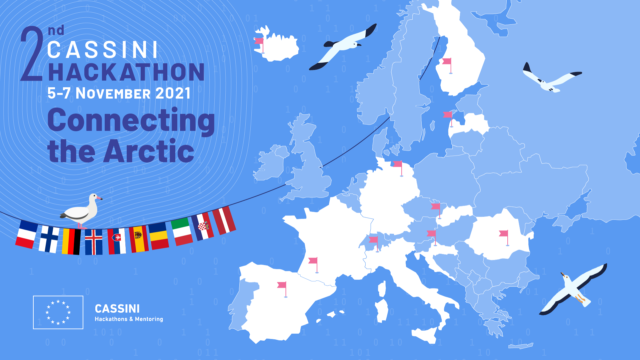
Is this related to the ESA Business Incubation Centres?
For the time being, this is a national initiative. An official ESA Business Incubator can be created only by ESA associated or full members, and for the moment Slovakia is still a European cooperating state. However, our government is committed to make Slovakia a new ESA associate member by next year. As we see this dynamic growth in the space industry and very strong interest from the companies to be part of a larger European network of space-related companies, we are confident that our European partners will be happy to have us on board.
What is the role of the Slovak Space Office in all this?
You can divide our activities into three main drivers. First, would be the development of the ecosystem in Slovakia by spinning in companies from non-space sectors, and supporting start-up creation, and technology transfer. The second pillar revolves around outreach and information dissemination. Finally, our third field of action is to support international cooperation and partnerships. The Slovak Space Office was established only this year in collaboration with the Ministry of Education, Science, Research and Sport of the Slovak Republic. However, we do not start on the green field, as these activities were covered within the Diversification services of the Slovak Investment and Trade Development Agency (SARIO).
A big share of our activities is dedicated to support our companies and researchers to get involved in international collaborations and to find new partners and customers. Here it requires a different approach when we speak about the downstream segment because it involves end users in non-space sectors such as agriculture or forestry interested in the final product or service. Initially, they might not understand the value of space data and it requires awareness creation to introduce its potential .
Is this what defines the biggest difference when it comes to approaching the upstream and downstream space segments?
It might be a bit more complex than that. What we observe is that our upstream sector mainly consists of satellite component and CubeSat manufacturers with some new niche areas emerging. While our upstream segment is still dominantly lead by public investments, it seems that the downstream sector is more appealing for private investments. One of the reasons is that bringing a downstream product to the market usually takes significantly less time. Additionally, there are a lot of possible connections with other markets that are already familiar with our local venture capital ecosystem such as green-tech, smart cities, and IT, only to name a few.
For what concerns our downstream sector, the highest number of Slovak companies involved are active in the field of Earth observation. Indeed, the biggest challenge here is to reach non-space customers. Two years ago, we started from the classic space value chain. Along the way, we realised that we needed to approach this in a specific way. A way of doing this is by identifying end customers in terms of public and private entities. Now that we are part of the Eurisy network we hope to better reach these end-user communities.
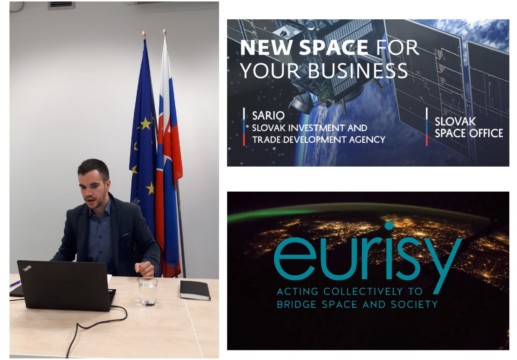
Was this the main reason to become a member of Eurisy?
Just a part of the reason. In general, our effort is to be more and more involved in European collaboration. We know Eurisy as a relevant community of space agencies working together with diverse actors at the intersection of space and non-space sectors. The association is also doing a great job in popularising space and satellite services among the European society and beyond. It generates opportunities for businesses and governmental actors, and as a member, we expect that our involvement will now also bring this added value to our country.
I am also positive that Slovakia as an emerging space country can contribute to the Eurisy network, bringing in fresh ideas and projects, as well as new skilled and capable companies and researchers to create joint opportunities.
Are there any specific topics related to the downstream space sector (climate change, user engagement, entrepreneurship, education, raising awareness among the general public, etc.) that are particularly relevant for Slovakia and that you wish to address more?
Slovakia is a small country, but it has rich wildlife and natural habitat. A lot of projects in the country are about monitoring natural areas and habitats. This is for sure a sector close to our heart with a lot of potential for downstream applications. More in general, we want to raise awareness among the public but also among companies, especially in the IT sector which is very strong in Slovakia.
Then, of course, the perspective of companies and end users is also in our interest. As mentioned before, spinning-in companies is about identifying and creating overlaps of what they are currently doing and what they are capable of. For non-space companies, this is a way not only to create a new market and diversify their portfolio, but also to increase their overall tech level. Space can also be an interesting label to attract new partners, and it can even mean an additional motivation for a company’s team and its prospective new members.
What are the future perspectives and priorities on the further development of the space sector in Slovakia?
On a national level, our main priority is to fully utilise the potential of the technical capabilities present in our country. We aim to be an active part of the larger space community across Europe and to enlarge the ecosystem of Slovakian space companies. We will intensify the work with start-ups within the aerospace cluster and our new incubator. The goal is to have at least five start-ups incubated already this year. Along with growing the number of actors in the Slovakian space industry, we also aim to maximise interconnectivity, collaborations, and awareness about potential space synergies and opportunities.
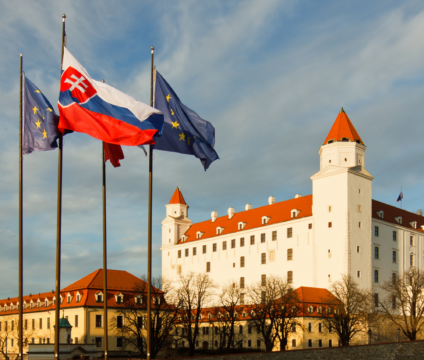 On the European level, we aim to increase our involvement with a variety of organisations and companies, and of course space agencies. Becoming an associate member of ESA is definitely one of the near-term priorities. Our involvement in calls under the umbrella of the European Union is also key. We want to facilitate our companies to become partners of consortia under Horizon Europe, and we invite European offices, associations, and companies that are looking for partners to reach out so that we can connect them with the most suitable partners in Slovakia.
On the European level, we aim to increase our involvement with a variety of organisations and companies, and of course space agencies. Becoming an associate member of ESA is definitely one of the near-term priorities. Our involvement in calls under the umbrella of the European Union is also key. We want to facilitate our companies to become partners of consortia under Horizon Europe, and we invite European offices, associations, and companies that are looking for partners to reach out so that we can connect them with the most suitable partners in Slovakia.
Of course, we do not want to limit our cooperation only to Europe. We also aim to continue building our ties with partners all around the globe. I am glad that, among other activities, the Slovak space sector will also be presented in our pavilion at EXPO DUBAI 2020, and we are preparing an attractive business mission focused on space going there at the end of October. We will also have an active participation at the next IAC in Dubai, and last but not least, we will be holding the 3rd edition of our annual main international event Emerging Space, taking place at the end of November online.
“Space is a highly collaborative and international field. With new space trends and a growing number of actors involved, it will be even more important to focus on the global state-of-the-art technology. It will also be crucial to create synergies between the old space powers and the emerging space countries. You can think of it as the synergy between well-established tech corporations and small innovative SMEs. While the corporations and old space powers can develop and produce almost anything by themselves, there is still a lot of fresh new ideas and innovative flexibility that the SMEs and emerging space countries can bring to the table.” – Mr. Michal Brichta, Head of Slovak Space Office Industry Branch
